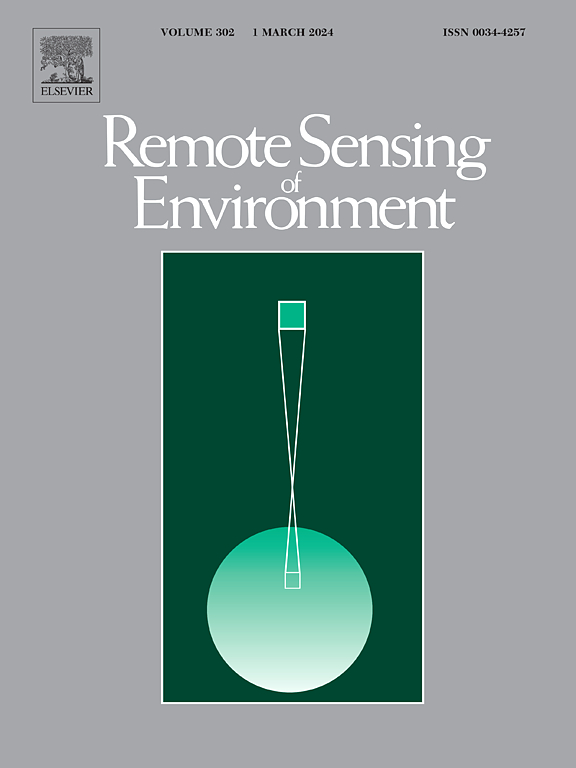创新的陆地表面温度和发射率同步检索混合算法:使用 SDGSAT-1 数据的案例研究
IF 11.1
1区 地球科学
Q1 ENVIRONMENTAL SCIENCES
引用次数: 0
摘要
分窗口(SW)和温度与辐射率分离(TES)算法已被广泛用于从各种任务的热红外(TIR)观测中估算陆地表面温度(LST)。但是,SW 算法需要事先估计陆地表面发射率(LSE)。TES 算法包含一个大气校正模块,这增加了操作性 LST 检索的复杂性和不确定性。针对这一问题,我们在本研究中提出了一种分窗口驱动的温度和辐射率分离(SWDTES)算法,通过结合 SW 和 TES 的各自优势,在无需大气校正的情况下同时估算 LST 和 LSE。SWDTES 算法的输入基本简化,除大气顶部 TIR 辐射率外,只需要大气水汽含量 (AWVC)。所开发的 SWDTES 算法被应用于新发射的可持续发展科学卫星-1(SDGSAT-1)任务的高空间分辨率热红外光谱仪(TIS)数据,并利用 MODIS 数据和地面测量数据对其性能进行了评估。交叉验证结果表明,在夜间情况下,MODIS 转换的 LSE 与使用 SWDTES 算法检索的 LSE 之间的相关系数 (r)、偏差和均方根误差 (RMSE) 分别为:波段 1 0.904、-0.033 和 0.038;波段 2 0.677、-0.008 和 0.014;波段 3 0.576、-0.000 和 0.008,表明两种 LSE 估计值之间具有良好的一致性。此外,利用地面测量进行的评估表明,原地 LST 与利用 SWDTES 算法检索的 LST 之间的 r、偏差和均方根误差分别为 0.99、-0.67 K 和 2.10 K。与 OSW 和 TES 算法相比,SWDTES 算法的均方根误差分别减少了 0.34 K 和 0.90 K,表明 LST 检索精度有所提高。我们的结论是,所提出的 SWDTES 算法可以实现 SDGSAT-1 任务的高精度和高分辨率 LST 检索,支持能源、水和碳循环建模方面的精细应用。本文章由计算机程序翻译,如有差异,请以英文原文为准。
Innovative hybrid algorithm for simultaneous land surface temperature and emissivity retrieval: Case study with SDGSAT-1 data
The split-window (SW) and temperature-and-emissivity separation (TES) algorithms have been widely used for land surface temperature (LST) estimation from thermal infrared (TIR) observations for various missions. However, the SW algorithm requires prior estimates of land surface emissivity (LSE). The TES algorithm encompasses an atmospheric correction module, which increases the complexity and uncertainty of operational LST retrieval. To address this, we proposed a split-window-driven temperature-and-emissivity separation (SWDTES) algorithm in this study to estimate LST and LSE simultaneously without the need of atmospheric correction by combining the respective advantages of SW and TES. The inputs to the SWDTES algorithm are largely simplified, which only requires atmospheric water vapor content (AWVC) apart from the top-of-atmosphere TIR radiance. The developed SWDTES algorithm was applied to the high spatial resolution Thermal Infrared Spectrometer (TIS) data from the newly launched Sustainable Development Science Satellite-1 (SDGSAT-1) mission, and its performance was assessed using the MODIS data and ground measurements. The cross validation shows that the correlation coefficient (r), bias and root mean square error (RMSE) between MODIS-converted LSE and retrieved LSE using the SWDTES algorithm for the nighttime case is 0.904, −0.033 and 0.038 for band 1; 0.677, −0.008 and 0.014 for band 2; and 0.576, −0.000 and 0.008 for band 3, indicating a good consistency between the two LSE estimates. In addition, the evaluation using ground measurements shows that the r, bias and RMSE between the in-situ LST and retrieved LST using the SWDTES algorithm are 0.99, −0.67 K and 2.10 K, respectively. Compared to the OSW and TES algorithms, the SWDTES algorithm reduces the RMSE by 0.34 K and 0.90 K, respectively, indicating an improvement in LST retrieval accuracy. We conclude that the proposed SWDTES algorithm can achieve high-accuracy and high-resolution LST retrieval from the SDGSAT-1 mission, supporting fine-scale applications in energy, water, and carbon cycle modeling.
求助全文
通过发布文献求助,成功后即可免费获取论文全文。
去求助
来源期刊

Remote Sensing of Environment
环境科学-成像科学与照相技术
CiteScore
25.10
自引率
8.90%
发文量
455
审稿时长
53 days
期刊介绍:
Remote Sensing of Environment (RSE) serves the Earth observation community by disseminating results on the theory, science, applications, and technology that contribute to advancing the field of remote sensing. With a thoroughly interdisciplinary approach, RSE encompasses terrestrial, oceanic, and atmospheric sensing.
The journal emphasizes biophysical and quantitative approaches to remote sensing at local to global scales, covering a diverse range of applications and techniques.
RSE serves as a vital platform for the exchange of knowledge and advancements in the dynamic field of remote sensing.
 求助内容:
求助内容: 应助结果提醒方式:
应助结果提醒方式:


